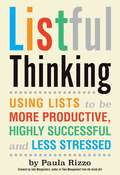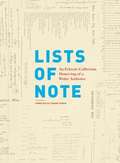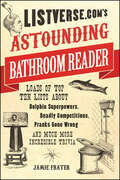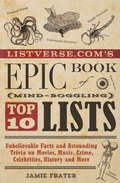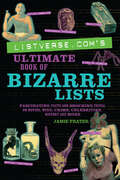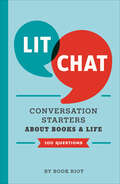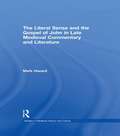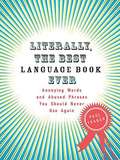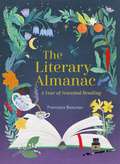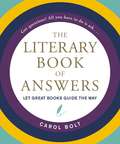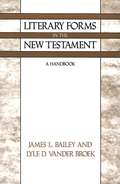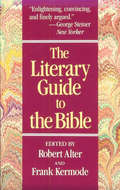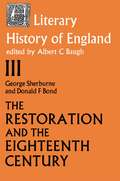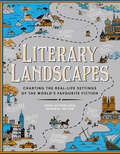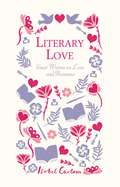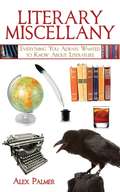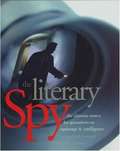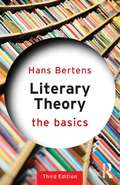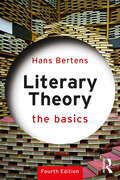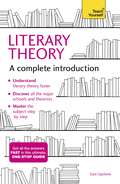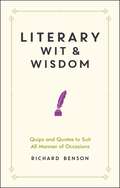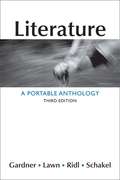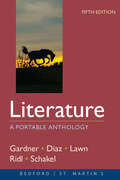- Table View
- List View
Listful Thinking
by Paula Rizzo Julie MorgensternWhat do Madonna, Martha Stewart, John Lennon, Ellen DeGeneres, Ben Franklin, Ronald Reagan, Leonardo da Vinci, Thomas Edison, and Johnny Cash have in common? Each is (or was) a list maker. These successful people, along with CEOs and successful entrepreneurs, all use lists to keep track of their ideas, thoughts, and tasks. Finding enough hours in the day to get everything accomplished and allow for some downtime can be a struggle. It's no wonder so many of us are stressed, overextended, and exhausted. More than half of all American employees feel overwhelmed, according to a study by the nonprofit Family and Work Institute. For the 54 percent of us who feel like we're chasing our own tails, Listful Thinking is here to prove that it doesn't have to be that way. You can still find time to relax, read a good book, and do the things you love. Listful Thinking is the book that will give readers their lives back with indispensible tips on saving time, getting organized, improving productivity, saving money, and reducing stress.
Lists of Note
by Shaun UsherLists of Note curates 125 unputdownable entries from a list of names that are as eclectic and intriguing as its contents, which include myriad reasons given by ancient Egyptians for missing work, Albert Einstein's demands of his estranged wife, F. Scott Fitzgerald's extensive conjugation of "to cocktail," and many more. Rarely intended for the public eye, these lists reveal hopes, priorities, and musings in a most engaging and entertaining way. Each transcript is accompanied by an artwork, most a captivating facsimile of the list itself. Richly visual and irresistibly readable, Lists of Note is a testament to the human urge to bring order to, poke fun at, and find meaning in the world around us--and is a gift of endless enjoyment and lasting value.
Listverse.com's Astounding Bathroom Reader: Loads of Top Ten Lists About Dolphin Superpowers, Deadly Competitions, Pranks Gone Wrong and Much More Incredible Trivia
by Jamie FraterCRAZY-BUT-TRUE TRIVIA, BIZARRE OCCURRENCES, DESPICABLE TORTURE, HILARIOUS RECORDS, UNBELIEVABLE CREATURES, AND MANY MORE FASCINATING FACTSFascinating facts, bizarre trivia and stomach-churning horrors await in Listverse.com's first-ever bathroom reader extraordinaire. Includes: Communicating with Aliens Death on Mount Everest Botched Executions Shocking Torture Methods The Rock 'n' Roll Hall of Fame Famous Quotes Nobody Said and Ridiculously Specific Predictions... that Came Trueyears old.During the MK Ultra military mind-control experiments, one prisoner was dosed with LSD for a mind-altering 174 days straight.
Listverse.com's Epic Book of Mind-Boggling Top 10 Lists: Unbelievable Facts and Astounding Trivia on Movies, Music, Crime, Celebrities, History, and More
by Jamie FraterCRAZY-BUT-TRUE FACTS, PECULIAR OCCURRENCES, DESPICABLE CRIMES, BIZARRE RECORDS, UNBELIEVABLE CREATURES, AND MANY MORE SHOCKING ODDITIESDelving into the shocking side of pop culture, science, and history, Listverse.com's Epic Book of Mind-Boggling Lists offers a wealth of fascinating reading with over 200 lists and more than 2,000 interesting facts, including: Alien Artifacts Creepy Urban Legends Bizarre Murder Weapons Horrific TV Accidents Outrageous Rock Tales Twisted Circus Acts Terrifying Villains Crazy-but-True Movie Plots Dirty CIA Operations Monstrously Evil Babysitters Strange Hamburger Facts Animal Freaks of Nature Mind-Blowing Technologiese captured after butt-dialed the police, bizarre things you can buy from vending machines, and even sex toys with ridiculously ancient origins.
Listverse.com's Ultimate Book of Bizarre Lists: Fascinating Facts and Shocking Trivia on Movies, Music, Crime, Celebrities, History, and More
by Jamie FraterAnother incredible collection of unusual trivia sure to shock and amaze, from the people who brought you The Ultimate Book of Top Ten Lists.Discover freaks of nature, odd crimes, shocking deaths, devastating disasters, blood-curdling rites, crazy conspiracies and much more. Here are just some of the lists full of fascinating facts awaiting you inside:•Gruesome Torture Devices•Mass Hysteria Outbreaks•Unbelievable Miniatures•Disturbingly Scary Clowns•Outer Space Mysteries•Astonishing Aphrodisiacs•Disgusting Ancient Jobs•Spooky Sports Curses•World-Famous Penises•Mail-Order-Bride Shockers•Brutal Pope Deaths•Outrageous Wedding Locales•Grossest Edible Animals•Appalling Religious Practices
Lit Chat: Conversation Starters about Books and Life (100 Questions)
by Book RiotGet the conversation started—at your book club, writer&’s group, or any friendly get-together—with these 100 reading-themed questions. Some invoke books that are tied to memories (name your favorite childhood picture book); others prompt you to choose ideal reading material for a hypothetical situation (if you were stranded on a desert island, what book would you want with you?). Some of them aim to get people comparing their favorite (and not-so-favorite) characters or authors, and others engage in popular debates among readers (name a movie adaptation you liked and defend your choice). Created to give readers of all persuasions an excuse to talk about books, ideas, and life itself, this collection from the largest independent community for book lovers in North America is a delight for any bibliophile. Reading is a solitary experience—but being a reader is a shared experience, and that shared experience is what Lit Chat is all about.
The Literal Sense and the Gospel of John in Late Medieval Commentary and Literature (Studies in Medieval History and Culture #12)
by MArk HazardFirst Published in 2003. Routledge is an imprint of Taylor & Francis, an informa company.
Literally, the Best Language Book Ever
by Paul YeagerBy turns gleefully precise and happily contrarian, this is a highly opinionated guide to better communication. In Literally, the Best Language Book Ever, author Paul Yeager attacks with a linguistic scalpel the illogical expressions and misappropriated meanings that are so commonplace and annoying. Identifying hundreds of common language miscues, Yeager provides an astute look at the world of words and how we abuse them every day. For the grammar snobs looking for any port in a storm of subpar syntax, or the self-confessed rubes seeking a helping hand, this witty guide can transform even the least literate into the epitome of eloquence. .
Literally, the Best Language Book Ever
by Paul YeagerBy turns gleefully precise and happily contrarian, this is a highly opinionated guide to better communication. In Literally, the Best Language Book Ever, author Paul Yeager attacks with a linguistic scalpel the illogical expressions and misappropriated meanings that are so commonplace and annoying. Identifying hundreds of common language miscues, Yeager provides an astute look at the world of words and how we abuse them every day. For the grammar snobs looking for any port in a storm of subpar syntax, or the self-confessed rubes seeking a helping hand, this witty guide can transform even the least literate into the epitome of eloquence.
The Literary Almanac: A year of seasonal reading
by Francesca BeaumanDiscover over 300 seasonal book recommendations in the ultimate reading list for book lovers everywhere.-----'I will be giving this book to everyone I know' - Elizabeth Day'Francesca Beauman writes about the books she loves with irresistible passion, knowledge and warmth ... This is the best kind of reading celebration' - Rachel Joyce-----Spanning the dreary, cold days of January to the first flushes of spring and then the blazing August heat, bibliophile Francesca Beauman offers up a wealth of book recommendations. From The Count of Monte Cristo to Elena Ferrante's Neapolitan Quartet, each has been selected to chime with a particular time of year and provide a richer reading experience. Beautifully illustrated throughout, this charming guide will delight, inspire and seriously extend your 'To Be Read' list!
A Literary Approach to the New Testament
by John Paul PritchardFrom the book: The literary approach views form and content as one and is concerned with what the book is. Just as the literary interpreter of Chaucer requires a wealth of information and insight concerning the times of Chaucer and the influences at work in him, so the literary interpreter of the New Testament requires information about it and insights into it. Knowing what the book is in itself and in its relations frequently clarifies significantly what the book means. General readers will profit from the presentation of this knowledge in developing their own insights into the New Testament. In asserting that the reader of the New Testament will find greater reward and understanding if he is a Christian, there is no intent to belittle the values of the book for non-Christian readers. Such readers should, however, exercise what Coleridge described as "the willing suspension of disbelief for a season" in order to enter, at least temporarily, into the spirit of the work. If we endeavor to read in this spirit, we shall find the work richer and more rewarding. For literary interpretation of the New Testament, the traditional Sunday school presentation has contributed little beyond acquainting children with episodes and agents. In it books are seldom treated as wholes made by an author with specific purpose and artistic designs. Books are to be analyzed upon sound anatomical principles for study of what they are before ideas for moral and religious instruction are drawn from them.
The Literary Book of Answers
by Carol BoltAn updated, repackaged edition of the bestselling divination tool and party favorite - ask a yes or no question, open the book, and discover your answer in the form of quotations from the world's most compelling books.Are you certain of your future? Your job? Relationships? Money?If the answer is "no," then this follow-up to the bestselling The Book of Answers will help you find the solutions from famous works of literature--and what a wealth of advice it provides...If you're curious about whether you'll get that promotion or land that account, whether you should buy a new car or tell your mother-in-law what you really think of her cooking, you can expect superb guidance from the likes of William Shakespeare, Jane Austen, Henry James, and Charles Dickens. Featuring such pearls of wisdom as "To thine own self be true," "Keep up appearances whatever you do," and "Tread lightly," this entertaining and provocative book will provide hours of fun and fortune-telling, while helping readers brush up on their literary knowledge. The perfect gift for questioners of all types and stripes, The Literary Book of Answers is for anyone who's got a burning question.
Literary Forms in the New Testament
by James L. Bailey Lyle D. Vander BroekTwo seminary teachers introduce to incoming students the specific literary forms that appear in the New Testament. Each article defines a common literary form, gives numerous examples, suggests ways in which knowledge of the form is helpful in interpretation, and offers an annotated bibliography for the specific form discussed. There is an exegetical emphasis throughout. Annotation c. by Book News, Inc. , Portland, Or.
The Literary Guide to the Bible
by Robert Alter and Frank KermodeRediscover the incomparable literary richness and strength of a book that all of us live with an many of us live by. An international team of renowned scholars, assembled by two leading literary critics, offers a book-by-book guide through the Old and New Testaments as well as general essays on the Bible as a whole, providing an enticing reintroduction to a work that has shaped our language and thought for thousands of years.
The Literary History of England: Vol 3: The Restoration and Eighteenth Century (1660-1789)
by George Sherburn and Donald F. BondThe paperback edition, in four volumes, of this standard work will make it readily available to students. The scope of the work makes it valuable as a work of reference, connecting one period with another and placing each author clearly in the setting of his time. Reviewing the first edition, The Times Literary Supplement commented: ‘in inclusiveness and in judgment it has few rivals of its kind’. This third volume covers the Restoration and the Eighteenth Century (1660-1789) and is co-authored by George Sherburn and Donald F. Bond (both at the University of Chicago).
Literary Landscapes: Charting the Worlds of Classic Literature (Literary Worlds Series)
by John SutherlandThe anticipated follow-up to the book lovers' favorite, Literary Wonderlands, LITERARY LANDSCAPES delves deep into the geography, location, and terrain of our best-loved literary works and looks at how setting and environmental attributes influence storytelling, character, and our emotional response as readers. Fully illustrated with hundreds of full-color images throughout. Some stories couldn't happen just anywhere. As is the case with all great literature, the setting, scenery, and landscape are as central to the tale as any character, and just as easily recognized. LITERARY LANDSCAPES brings together more than 50 literary worlds and examines how their description is intrinsic to the stories that unfold within their borders. Follow Leopold Bloom's footsteps around Dublin. Hear the music of the Mississippi River steamboats that set the score for Huckleberry Finn. Experience the rugged bleakness of New Foundland in Annie Proulx's The Shipping News or the soft Neapolitan breezes in My Brilliant Friend. The landscapes of enduring fictional characters and literary legends are vividly brought to life, evoking all the sights and sounds of the original works. LITERARY LANDSCAPES will transport you to the fictions greatest lands and allow you to connect to the story and the author's intent in a whole new way.
Literary Love: Great Writers on Love and Romance
by Isobel CarlsonA collection of quips and quotes from some of the greatest writers ever, on the subject that has inspired so much of their work-love.All around the world, every second of the day, people are falling in love. It has been the subject of books and songs for centuries, with many great writers, past and present, having something to say on the matter-from Aristotle ("Love is composed of a single soul inhabiting two bodies") to Stefan Zweig ("I am sure that no one else has ever loved you so lavishly, with such doglike fidelity, with such devotion, as I did and do"). This collection of heartfelt quotations from diaries, letters, poems and prose is perfect for anyone feeling the heady rush of romance, whether it's an old flame still burning bright or a new one just beginning to spark.
Literary Miscellany: Everything You Always Wanted to Know About Literature (Books of Miscellany)
by Alex PalmerWouldn't it be great to be a fly on the wall as the great writers took pen to paper (or fingers to keyboard)? While reading this work, you'll be just that. Here are behind-the-book stories and facts about authors, publishing and everything literary that will entertain both casual and serious readers. Among the questions asked and answered: When Did Literature Finally Get Sexy? Is Coffee or Opium Better for Literary Creativity? Why Are the Best Autobiographies so Embarrassing? Why Do Some Detectives Use Their Minds and Others Their Fists? Who knew that bestseller lists and children's books could be the source of intense controversy? Or that even the biggest writers had to scrape by, with odd jobs and inventions like the Mark Twain Self-Pasting Scrapbook? In Literary Miscellany, examine the trend of "fake memoirs," with a list of who lied about what, and a rogues' gallery of hoaxers dating back centuries. From epic poetry and Homer to pulp fiction and Harry Potter, Literary Miscellany is a breezy tour through the literature of today and yesterday, packed with enough interesting facts to entertain both the erudite professor and pleasure reader.
The Literary Spy: The Ultimate Source for Quotations on Espionage and Intelligence
by Charles E. LathropThe Literary Spy providesa unique view of the intelligence world through the words of its own major figures (and those fascinated with them) from ancient times to the present. CIA speechwriter and analyst Charles E. Lathrop has compiled and annotated more than 3,000 quotations from such disparate sources as the Bible, spy novels and movies, Shakespeare's plays, declassified CIA documents, memoirs, TV talk shows, and speeches from U. S. and foreign leaders and officials. Arranged in thematic categories with opening commentary for each section, the quotations speak for themselves. Together they serve both to illuminate a world famous for its secrets and deceptions and to show the extent to which intelligence has manifested itself in literature and in life. Engaging, informative, and often irreverent,The Literary Spyisan exceedingly satisfying book--one that meets the needs of the serious researcher just as ably as those of the armchair spy in pursuit of an evening's entertainment.
Literary Theory: The Basics (The Basics)
by Hans BertensThis third edition of Hans Bertens' bestselling book is an essential guide to the often confusing and complicated world of literary theory. Exploring a broad range of topics from Marxist and feminist criticism to postmodernism and new historicism Literary Theory: The Basics covers contemporary topics including: reception theory and reader response theory the new criticism of postmodernism the 'after theory' debate post-humanism, biopolitics and animal studies aesthetics Literary Theory: The Basics helps readers to approach the many theories and debates in this field with confidence. Now with updated case studies and further reading this is an essential purchase for anyone who strives to understand literary theory today.
Literary Theory: Theory And Literary Practice (The Basics #Xi)
by Hans BertensNow in its fourth edition, Literary Theory: The Basics is an essential guide to the complicated and often confusing world of literary theory. Readers will encounter a broad range of topics from Marxist and feminist criticism to postmodernism, queer studies, and ecocriticism.Literary Theory: The Basics shows, in an always lucid and accessible style, how literary theory and practice are connected, and considers key theories and approaches including: humanist criticism; structuralist and poststructuralist theory; postcolonial theory; posthumanism, ecocriticism, and animal studies; digital humanities and print culture studies. Literary theory has much to say about the wider world of humanities and beyond, and this guide helps readers to approach the many theories and debates with confidence. Expanded with updates throughout, this is the go-to guide for understanding literary theory today.
Literary Theory: A Complete Introduction
by Sara UpstoneLiterary theory has now become integral to how we produce literary criticism. When critics write about a text, they no longer think just about the biographical or historical contexts of the work, but also about the different approaches that literary theory offers. By making use of these, they create new interpretations of the text that would not otherwise be possible. In your own reading and writing, literary theory fosters new avenues into the text. It allows you to make informed comments about the language and form of literature, but also about the core themes - concepts such as gender, sexuality, the self, race, and class - which a text might explore.Literary theory gives you an almost limitless number of texts to work into your own response, ensuring that your interpretation is truly original. This is why, although literary theory can initially appear alienating and difficult, it is something to get really excited about. Imagine you are standing in the centre of a circular room, with a whole set of doors laid out around you. Each doorway opens on to a new and illuminating field of knowledge that can change how you think about what you have read: perhaps in just a small way, but also perhaps dramatically and irrevocably. You can open one door, or many of them. The choice is yours. Put the knowledge you gain together with your own interpretation, however, and you have a unique and potentially fascinating response. Each chapter in Literary Theory: A Complete Introduction covers a key school of thought, progressing to a point at which you'll have a full understanding of the range of responses and approaches available for textual interpretation. As well as focusing on such core areas as Marxism, Modernism, Postmodernism, Structuralism and Poststructuralism, this introduction brings in recent developments such as Eco and Ethical Criticism and Humanisms.
Literary Wit and Wisdom: Quips and Quotes to Suit All Manner of Occasions
by Richard BensonWith quips, quotes and insults from beloved classic literary writers such as William Shakespeare to modern literati Zadie Smith, Literary Wit will ensure that you’re never at a loss for the perfect witticism.
Literature: A Portable Anthology (3rd Edition)
by Janet E. Gardner Beverly Lawn Jack Ridl Peter SchakelThe third edition of Literature: A Portable Anthology presents, in a compact and highly affordable format, an ample and flexible choice of fiction, poetry, and drama for introductory literature courses. Arranged chronologically by genre, the stories, poems, and plays are complemented by editorial matter that offers enough help for students learning to think, read, and write about literature, without interfering with their enjoyment of the literary works.
Literature: A Portable Anthology
by Janet E. Gardner Beverly Lawn Jack Ridl Peter Schakel Joanne DiazLiterature: A Portable Anthology features nearly 250 literary selections with thorough coverage of reading and writing about literature, all at an affordable price.
